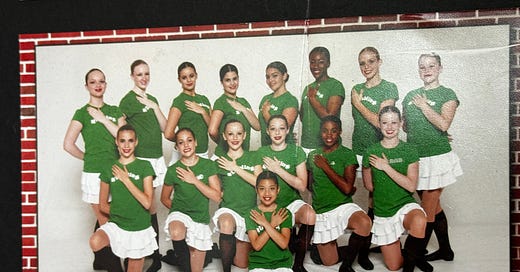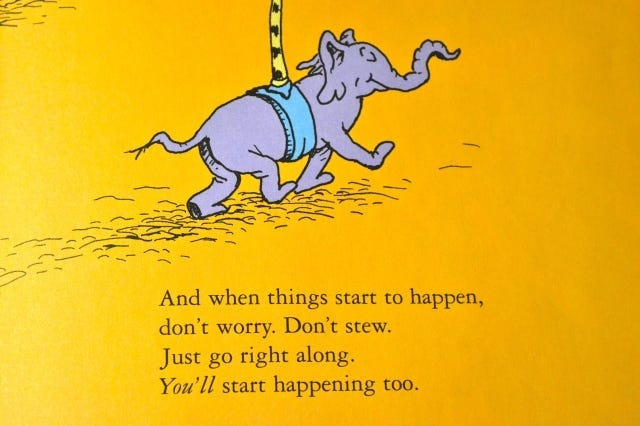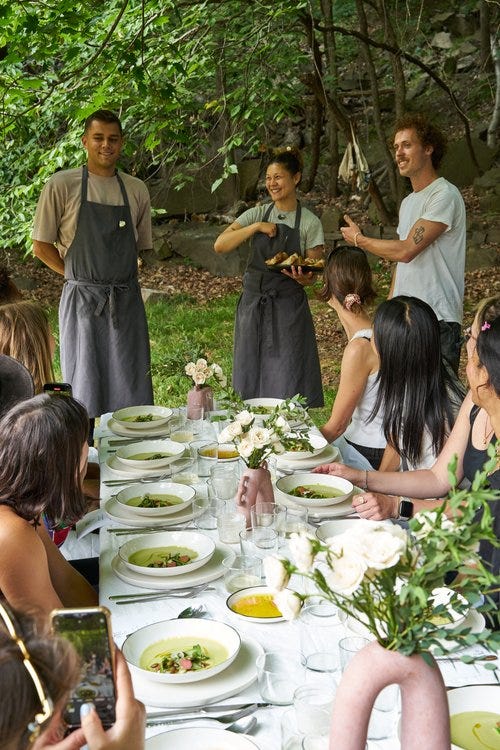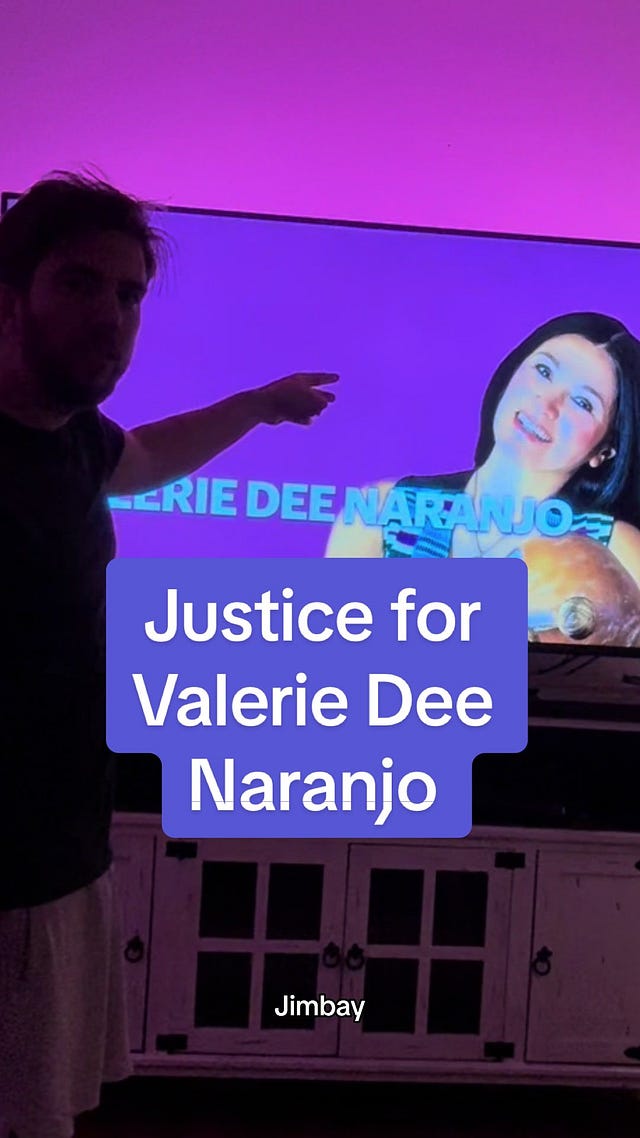Edition #167: What Can One Dance Studio Do?
Better late than never! Plus, there's no meal better than the Italian Sunday lunch, hyper-specific love languages, and Hanya Yanagihara's New York apartment
A Note From the Editor
Start here, as a young girl with a loud mouth. An odd little duck, this girl, with her bowl haircut and her lazy eye. Not as tough as she came across but spunky enough to earn a reputation as bossy amongst her peers, “bad” amongst adults who didn’t care to give her a closer look. This girl comes up in a suburb of swamp town. You can’t get anywhere in swamp town without a vehicle and driving age is many years away, so the girl’s life is relegated to a small physical area: school, home, friend’s house, the rectangle of her subdivision.
Within the subdivision, there is a neighborhood park in front of a retention pond which she can walk to, but nothing good happens there. Mostly teenagers selling drugs or making out in the plastic tunnels, a few stray kids using the swing set. So you see, there is nowhere for this girl to go, nothing to do or explore or discover. In the unwritten version of this story, the girl’s fate is circumstantially sealed before she has the chance to blossom. She will get into trouble, make the sort of mistake that shapes her life from early on, and she will go nowhere. A common tale.
Yet this girl would secure the Golden Ticket, access to a place wholly unlike the environment in which she grew up. It didn’t look like much from the outside—light-blue facade with large, square windows, just across the street from a cow pasture—but this place would extricate the girl from the trapping walls of her circumstances.
_____
Not every kid requires a Golden Ticket. Some kids have guardians with freed-up resources, time and money to spare. But for the rest of us, a Golden Ticket was our shot at a different kind of life, and mine came in the form of a trade. Once per week, I would clean in exchange for the dance classes we couldn't afford. An early, vital lesson: if you can’t make it work the regular way, come up with an alternative solution. Or, in the wise words of our dance studio owner and matriarch Miss Val, “Where there’s a will, there’s a way.”
I didn’t mind cleaning the dance studio, dusting the blinds and vacuuming the carpets, but it was the occasional Sunday I got to clean Miss Val’s house that I really looked forward to. One week I organized the costume room, inventing stories as I sorted through tutus and bodysuits, top hats and prop canes. A whole room of costumes in a home, imagine that. Another week, on one of Florida’s rare fall days, I was tasked with gathering kindling for the fire. A chill cooled the skin on my arms as I bent down to inspect the twigs, leaves crunching under my Payless sneakers. Inside, Miss Val taught me how to light a fire. We dipped gingersnaps into mugs of tea and I was so happy. I never wanted to go home. This was my Golden Ticket.
_____
Our after-school days maintained a steady rhythm. Pile into the van, arrive at the dance studio, change into class clothes. The evening’s schedule would vary each day. Jazz, a break, tap, hip hop. Or ballet, lyrical, break, acrobatics. Between classes, we would squeeze in homework and scarf dinner in the back lobby—something your parents packed or a package of microwaved Ramen Noodles or, if you were lucky, a sub from the Blimpies on the corner. Somewhere around 9 pm, our classes would be over. We’d be picked up and taken home, only to return the next day and do it all again.
On the car ride home, I would make subtle attempts to gauge the state of the evening’s war. Was it just the standard yelling, or had the yelling taken a darker turn? Had it reached its peak, or would it be escalating as I arrived? I wanted to know and I desperately didn’t want to know. Whatever the answer, I steeled myself. Listened to the radio, rolled down the window, closed my eyes.
Coming into the war at a later hour shortened the time I had to endure it. From four hours, had I come home straight after school, to one hour, which is how long I stayed awake after returning home from dance each night. That’s three hours, four nights a week, ten months a year, for roughly ten years. A critical mass of time spent outside the war zone, those precious hours I got to forget. A lesser-known benefit of my Golden Ticket.
_____
Outside of those four days a week of class, there were weekend rehearsals and shows, week-long summer camps where we auditioned for our desired roles and painted sets and made costumes, printed scripts and memorized lines. I made my theatrical debut as the Evil Queen in Snow White, delighted to have permission to be the Bad Guy, to make the audience laugh.
There was the annual performance in Cocoa Beach where we all piled into the van on a cool Saturday in November, hoodies over our costumes, red lipstick on our mouths. We would dance on an unraised stage, more wedding dance floor than anything else, but it felt like the big leagues to us. Afterward, we strolled past vendors selling painted wind chimes and fresh squeezed lemonade. We would pool our money to buy a giant bag of kettle corn, eating it by the fistful on the ride home. None of us were ready to go back to our lives just yet. We wanted Miss Val to tell us one more story, for that drive to last a little bit longer.
Years later, when we had put in the hours and become better dancers, my three best friends and I decided to do a number together. We rehearsed and rehearsed, dancing to a sad Regina Spektor song, emoting like wounded Hollywood actors. And on that glorious weekend of our big competition, we won it all. Platinum, overall high score. Some studios, some dancers at my studio, were accustomed to this sort of total victory, but I was not. The four of us crowded in the hot tub at the hotel that evening, laughing loudly, relishing our temporary celebrity status. A boy from another studio recognized us and asked if we were the girls from that number. “It was amazing,” he gushed. The next day, I won my first dance convention scholarship.
I ended the weekend on cloud nine. I was improving, becoming a better dancer, and I finally had proof. Some naive part of me expected my good fortune to follow me home. The sky was just starting to darken as I entered the house and walked into the kitchen, looking for someone to share my joy with. In the careful silence, I heard mounting tension. War would start early that night and no one would ask about my weekend, no one would congratulate me or share in my accomplishment. I would be brought, efficiently and unceremoniously, back down to earth.
But at dance the next day, my jazz teacher would beam upon hearing the news. And a few months later, long after the excitement had worn off, my lyrical teacher would listen as I read her the first short story I’d ever written. A horror story, long and juvenile, but she would listen to the entire thing. At dance, the small, inconsequential facets of my little life mattered.
_____
We are neither mayors nor miracle-makers, just ordinary people living the best lives we can with what we’ve been given. The world has big problems that feel unfixable to the individual, yet we should never forget the ordinary ways we can make this place better. Recognizing the value of a safe third space for kids, creating a Golden Ticket for those who need it, investing in programs that enable young people to have the opportunity to see themselves in a different light, where adults might be able to spot their potential and nurture it. Take a bad girl and turn her into a better one. Or better yet, give her support and hold her to a high standard. Teach her to hold herself to one.
There is so much magic in these places, so much goodness in the people who run them. Community centers. YMCAs. Public libraries. Gyms. Football fields. Music schools. Theaters. Skating rinks. Martial arts facilities. And, of course, dance studios. To create an entire universe where young people can feel safe and tended to is no small thing. To choose accessibility over profit, to dedicate your life to building and maintaining an arts-centered business in a town that so desperately needs the arts, and to run that business with integrity for 35 years in this greedy world, in this economy, is nothing short of miraculous.
_____
What can one dance studio in Kissimmee, Florida do, really? It can teach dance, teach discipline and respect and the value of hard-work. It can teach songs from long-closed Broadway shows, the monk-like patience required in waiting and waiting and waiting for the green light to switch from ballet shoes to pointe shoes. It can teach trust; the van will be there to pick you up every day after school, no questions asked.
It can teach the wideness of the world, for perhaps you are stuck in your small body in your small life, but Miss Val has been to places far from here. The Nile River, the Pyramids of Giza. And you can sit on that floor crowded around her stool, staring at her toes gnarled by years of practice and listen to her stories, listen to her recite the lyrics of show tunes written long before your time. You can realize your world is growing larger with each story, with each song. You are learning there is life beyond this. It is yours for the taking if you want it.
And on the evening of your final dance recital, the closing of a chapter that is both the prequel and the entire novel, you can marvel at the young woman you have grown to be. Before gracing the stage for that final number, before inhaling the silence of the audience, Miss Val will hand you a book that brings it all back.
The younger you, eating gingersnaps by the crackling fire. The teenaged you, trading ballet class for a failed attempt at cheerleading. All the ways you tried to leave but found your way back again. You will open that book and be transported to your childhood and to your future. You’ll realize that all along she had been preparing you for this, for your chance to go out into the world. You will be pushed, gently, out of the nest. With any luck, you might just make her proud.
____
Cheers, my dears, and as always thank you for reading. Today’s essay is dedicated to Raskin Dance Studio, the beloved place that made me who I am today. I found out a few weeks ago that the studio was closing its doors after nearly four decades. I’ve spent the last few weeks reflecting on all the ways the studio shaped me and, in a broader sense, about how impactful these spaces are for youth—especially when you consider the design flaws of the typical American suburb.
Have a wonderful weekend! I’ll be stretching my body on a Reformer, going to a farmers market, and walking in the forest as I prepare for my final stretch in Africa. Call your childhood dance teacher/coach/mentor and thank them. Eat a piece of pizza. Sit on a park bench and listen to the birds.
Three Pieces of Content Worth Consuming
There’s No Meal Better, Or Longer, Than An Italian Sunday Lunch. This piece was exquisite. A beautiful account of the long, elaborate Italian Sunday lunch tradition. Modern day Sunday lunches may not be as regular or intense as they once were, but they do still exist. The photos of these lunches are beautiful. This makes me want to have a standing mealtime tradition. There is nothing like a standing gathering, the beauty of it and the way it anchors your week or month.
What Are Your Hyper-Specific Love Languages? This year, I realized my love language is physical touch—makes sense, seeing as I come from a super affectionate family. This sweet post made me think about my more specific love languages, like always being willing to lend a listening ear or a word of advice or writing sweet little letters to people I love. On the receiving end, I feel so loved by a friend who always makes it clear how badly she wants to me come back to Costa Rica, or by another who always picks me up from the airport when I arrive back to New York.
Novelist Hanya Yanagihara on Living With 12,000 Books. I love this woman. The OG tastemaker, genius, and all around icon. I’ve read her novels, seen her give a talk, and if you slap her name on any headline, I’m reading it. I like the interviewer’s question about whether your home is a winter place or a summer place. I like that Yanagihara admits living in New York is mildly hellish but, for art’s sake, necessary. I like that I don’t find her place very aesthetic and that she has a zillion books that aren’t color-coded.
Perhaps You Should… Attend a Supper Hike
When I was living in NYC full time, summers always made me ache. Summer felt like the time when I most wanted to be immersed in nature, not crammed onto a sweaty rooftop drinking an $18 Aperol Spritz. If you happen to be a New Yorker with similar summertime feelings, these supper hikes might scratch your itch. Sounds like a cute way to spend an afternoon!
On another note, the business of coexistence is BOOMING, people! Co-working spaces, co-living spaces, paid activity clubs, and one off gatherings. People are paying to read together in silence! It’s interesting to consider what societal circumstances got us here and how our hunger for togetherness will be met by those savvy enough to create solves for the separation.
**Bonus Content** (Justice 4 Valarie)
If you are or have ever been an SNL fan, you need to know about this weirdness—seems like a Lorne Michaels thing. And whatever this Powerpoint soap box party is, I want in.
Also, I laughed so hard at this and this (Why? Couldn’t say for sure). I want to bake this cake, and did you know about apology languages? Apparently mine is request forgiveness. Interesting!
A Quote From A Book You Should Read:
“The simple things are also the most extraordinary things, and only the wise can see them.”
-The Alchemist by Paulo Coelho








